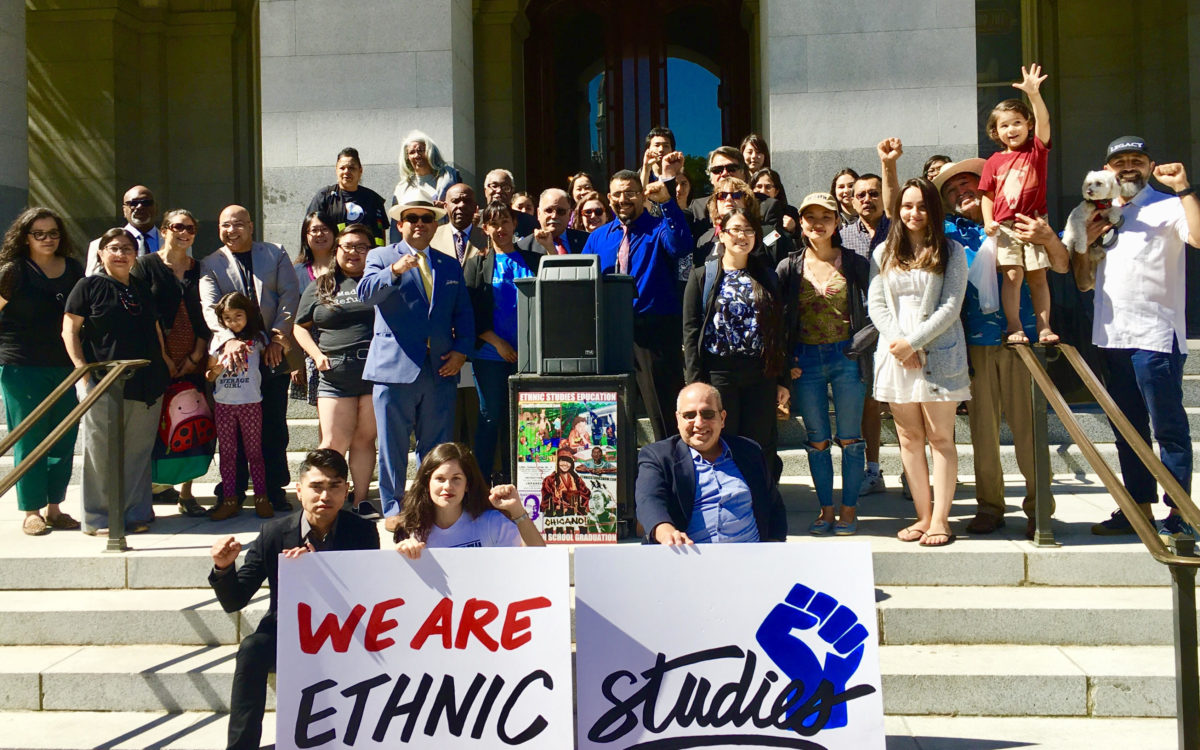Gov. Gavin Newsom signed legislation Friday making California the first state to require all students to complete a semester-long course in ethnic studies to earn a high school diploma.
The mandate will take effect starting with the graduating class of 2029-30, although high schools must start to offer courses starting in the 2025-26 school year. Hundreds of high schools already have such courses, and Los Angeles Unified and Fresno Unified voted last year to require students to take ethnic studies.
Newsom’s signature of Assembly Bill 101, authored by Assemblyman Jose Medina, D-Riverside, ends a decades-long quest by advocates for a curriculum that more closely reflects the history, culture and struggles of California’s diverse population.
And it comes one year after Newsom vetoed a nearly identical bill amid strenuous opposition to the first draft of a model ethnic studies curriculum that critics, particularly Jewish organizations, dismissed as prejudiced and discriminatory.
Since then, the Instructional Quality Commission, which oversees curriculum development, significantly revised the draft, eliminating much of the most contentious material, and in March the State Board of Education approved the curriculum, which is optional for districts to use.
The legislation authorizing the creation of an ethnic studies curriculum stated that it should draw attention to the four ethnic and racial groups whose history and stories have been traditionally overlooked and have been the focus of college ethnic studies courses: Blacks, Latinos, Native Americans and Asian Americans. The model curriculum does that while encouraging schools to include discussions on the ethnic heritage and the legacies of students in their communities. The model curriculum includes lesson plans on Sikh, Jewish, Arab and Armenian Americans, which were added after those groups objected to being left out in earlier drafts.
In his veto message a year ago, Newsom reiterated his support for ethnic studies but called the early draft of the model curriculum “insufficiently balanced and inclusive.” He did not refer to the earlier veto in his press release on Friday, but he did point out that the bill includes “a number of safeguards to ensure that courses will be free from bias or bigotry and appropriate for all students.”
Those safeguards include the requirement that ethnic studies instruction and the instructional materials “not reflect or promote” any bias, bigotry or discrimination and that school districts and charter schools present a proposed ethnic studies curriculum at a separate public hearing before adopting it to give the public a chance to share their opinions of it. And, in a blunt reference to the much-criticized first draft of the model curriculum, the Senate Appropriations Committee added an amendment that urges that school districts “not use the portions of the draft model curriculum that were not adopted by the Instructional Quality Commission due to concerns related to bias, bigotry and discrimination.”
In his statement, Newsom said that ethnic studies will help expand educational opportunities in schools and credited it for raising academic achievement.
He referred to recent research, co-authored by Thomas Dee, a professor at the Stanford Graduate School of Education, that ethnic studies had a positive impact on attendance and graduation rates and college enrollment for several classes of below-average San Francisco students who took the course in ninth grade.
Medina thanked Newsom for signing the bill in the press release. “The inclusion of ethnic studies in the high school curriculum is long overdue,” Medina said. “The signing of AB 101 today is one step in the long struggle for equal education for all students.”
Secretary of State Shirley Weber, an emerita professor of Africana Studies at San Diego State University, where she created an ethnic studies program, said, “At a time when some states are retreating from an accurate discussion of our history, I am proud that California continues to lead in its teaching of ethnic studies. This subject not only has academic benefits, but also has the capacity to build character as students learn how people from their own or different backgrounds face challenges, overcome them and make contributes to American society.”
Enactment of AB 101 releases $50 million in this year’s state budget for all county offices of education, charter schools and school districts to develop ethnic studies curriculums. The money will be distributed to schools serving high school students, as a straight apportionment, according to the California Department of Education.
“There is no requirement for CDE or any other agency to manage the program,” said California Department of Education Information Officer Jonathan Mendick. “Districts must spend the money in accordance with the requirements of AB 101 which has myriad guardrails built in around curriculum that meets the graduation requirement.”
